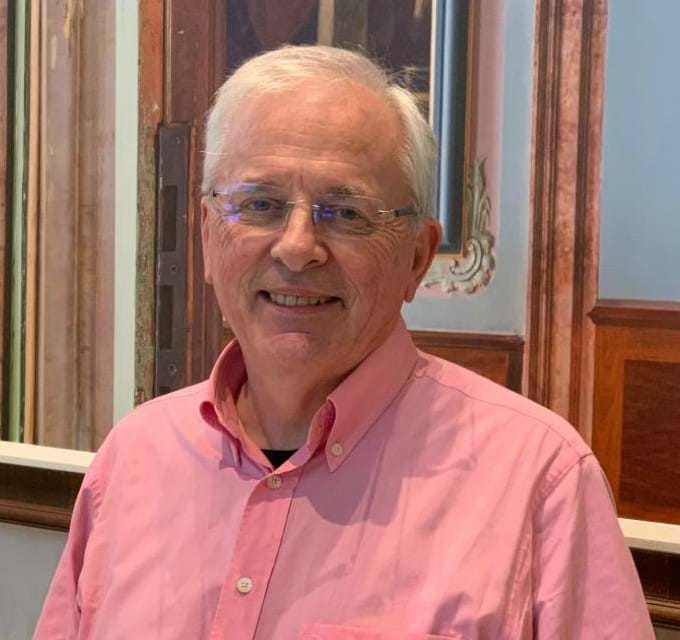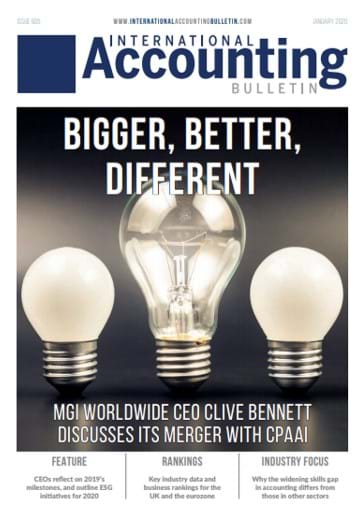Front page cover feature for MGI Worldwide and CPAAI CEO Clive Bennett!
This month’s IAB Cover Story showcases news of our Merger with a Front Page Cover Feature and interview with CEO Clive Bennett where he discusses the merger of MGI Worldwide with CPAAI in depth, and you can read all about it here!
Bigger, Better, Different.
That’s the message behind our merger and it’s what prompted the decision in the first place. Joining forces at the start of the year has already been proving beneficial to our member firms; with many stories of collaboration starting to emerge from MGI Worldwide and CPAAI Firms around the world, particularly in Latin America where they are starting to get together and build relationships with each other.
Clive Bennett speaks about what the merger means for the newly combined organisation. Read his interview below:
Zoya Malik: What have been the main objectives of this merger?
 Clive Bennett: Both parties had been looking for a merger partner for a while, and we had three main objectives: first, to strengthen our position on the East Coast of the United States. We’re very strong on the West Coast but have lost important firms on the East Coast through consolidation in the market, so we needed a partner with a significant presence there to strengthen our US offering.
Clive Bennett: Both parties had been looking for a merger partner for a while, and we had three main objectives: first, to strengthen our position on the East Coast of the United States. We’re very strong on the West Coast but have lost important firms on the East Coast through consolidation in the market, so we needed a partner with a significant presence there to strengthen our US offering.
Second, to maintain our position in the rankings of the mid-tier networks. Staying within the top 20 networks is important to our members, our marketing, our reputation and our influence.
Finally, we have ambitious plans for our members and the extra resources will enable us to carry them out. In turn, CPAAI needed the West Coast and, outside the United States, to join up with a more global organisation like ours, which is very diverse and has advanced marketing, governance and management.
ZM: What were the criteria when you were looking for partners?
CB: Apart from the needs I mentioned before, we wanted an organisation of a similar size; there’s no point going through a merger if it’s just going to add a small amount to the bottom line.
We also didn’t want ourselves to be swallowed up by a giant and end up losing our brand. CPAAI was particularly attractive to us because our strengths are complementary. Its strength east of the Mississippi in the US and our strong global presence, organisation, branding and marketing made for an ideal fit.
ZM: You mentioned having “ambitious strategies”. How do those manifest themselves for your member firms?
CB: We believe we’re ahead of the curve in understanding that brand strength is not about logos and colours: it’s about building and articulating values and capabilities.

We’re never going to match the brand recognition of the Big Four, because we’re never going to spend serious money on promotion and advertising, but when clients and firms come into contact with our brand, we want that experience to leave the very best, memorable impression. That means investing in marketing and communications.
As an example, nearly 50% of MGI Worldwide firms now adopt our brand in their names. In that way, the strength of the global brand enhances their local reputation, while their own strength in their local markets supports the global brand. The better the global brand, the higher the local brand value.
It’s a symbiotic relationship. We’re mid-tier, but we’ve got 130 years of experience between the two merger partners and, for the foreseeable future, we are strong, confident and gaining recognition.
ZM: With that ambition, what are the challenges for MGI Worldwide during the merger with CPAAI?
CB: For at least the medium term, there is little financial effect. This is not a merger of two commercial, profit-making enterprises, where you would immediately look to reduce administrative cost by sharing services and cutting headcount. We are already both lean organisations with very little functional overlap.
Going forward, there will be synergies and we’ll be able to grow our teams and do more. We don’t focus on cost savings, but more on what we can achieve together, on strategic, operational and cultural synergies using complementary resources.
Long term, we will be looking at our cost structure and seeing what we can do. MGI Worldwide has considerably more resources than CPAAI, so that is a benefit for it, and we benefit because its best expertise and people are coming on board and strengthening our team.
ZM: What are the benefits for member firms?
CB: We don’t determine which business areas firms go into, or how they manage their businesses.
We don’t share methodologies, human resources, systems nor business strategies, but we do have a strategy covering global marketing, communications and quality assurance. We want to do more work together, such as business development, referrals and knowledge exchange.
I visited one of our smaller firms in Brazil about two years ago, and they were talking about our head office. I realised they assumed the global HQ must be this massive organisation, with scores or even hundreds of staff: it’s not, it’s tiny, and we can make that more effective without increasing the size. We already outsource services such as accounting, digital, design and the operation of our quality assurance system. Our ambition is to give our member firms a lot more support.
On quality, we want to make sure that the quality of what a member firm in Nairobi offers is comparable to what you would find in Chicago, even though their markets and requirements may be very different. The focus is on technical and commercial quality, and we can support those firms by giving them tools, training and customised marketing provision.
ZM: Where does the merged entity go from here?
CB: In certain aspects, we think we are ahead of the curve developing regional aspirations. We are organised into eight regions. While nearly all our competitors view their three or four regions as just lines on a globe, we take the view that businesses work best together in geographic clusters that share cultural, economic and business values and needs.
For example, we have the UK and Ireland as separate from Europe. That is nothing to do with Brexit; I found very early on that our British and Irish members take a close relationship with European colleagues and their meetings very seriously and, as a result, cooperate on numerous projects.
What makes this small region effective is that the members have a commonality of purpose and needs – language, training, legal and fiscal systems, regulatory regimes and business approach. You can’t get that across 28 jurisdictions, so carving a dozen UK and Ireland firms out as a separate region over a decade ago made sense. We are looking to continue promoting that level of regional cooperation, rather than viewing all territories through the same prism. Our regional structure is important to us, and is something we’re very keen to maintain and enhance.
ZM: Will there be a shift to any new target markets? Is there a different kind of criterion applied to more developing geographies and economies, where members are coming from?
CB: Firstly, we have very rigorous due diligence and quality assurance processes for all firms entering the network. We are aware that there are some countries where there is less regulation and we have to take that into account. We give them a lot of support and our aim is to ensure quality is at the highest level in all parts of the globe.
Secondly, there are ways we give members access to various tools to assist them in a variety of areas such as finding business in their markets, improving their quality, communicating with their markets and clients, using membership to leverage their market positioning. That’s why we’ve invested a lot in training and communication.
Finally, we see our role as being a ‘mentor’ to our members, helping them achieve their potential by leveraging their membership of a global organisation.
ZM: Finally, where is new investment focused to strengthen the network?
CB: We are investing in the way that we will use the back office of our website and have a large extranet members’ portal. We want to be more efficient and better at all we do.
With the cloud proposition, AI, blockchain, you name it, all these technologies are ‘mass effect’ and we are helping our members to build closer relationships, globally, with technical partners and to share knowledge and expertise to transform their businesses.
We invest in continually improving our conferences. We typically hold around 15 regional and global conferences every year. These get-togethers create an environment to bring people together, make friendships, build relationships and focus on debating new trends, business issues and technological change.
For example, five years ago we thought that since KPMG was spending $100m on artificial intelligence, it was limited only to the very biggest firms. Well, guess what, just as for the whole history of computing and digital information, since then AI has radically rescaled and now you can get very, very good artificial intelligence systems for a fraction of the cost, accessible to even quite small practices and their clients.
We’re confident that this merger and the resultant sharing of resources, ideas and relationships will have a transformative effect for many of our members, their clients and our brand.
For further details about the merger, or to discuss any of the points raised in the interview, please contact Clive Bennett on [email protected] or Maxine Brock on [email protected].
MGI Worldwide with CPAAI is a top 20 ranked global accounting network and association with 9,000 independent auditors, accountants and tax experts in some 380 locations in almost 100 countries around the world.
